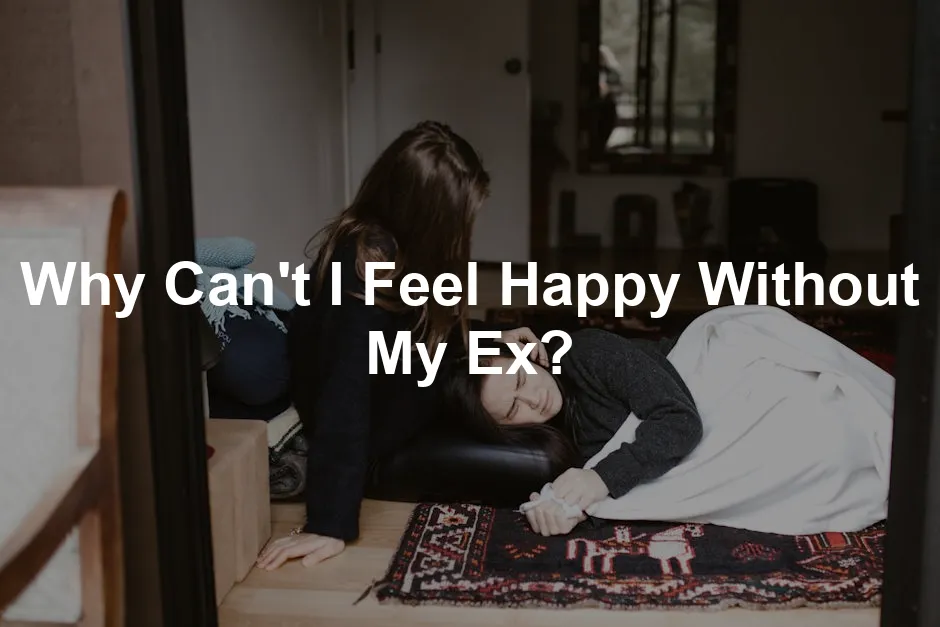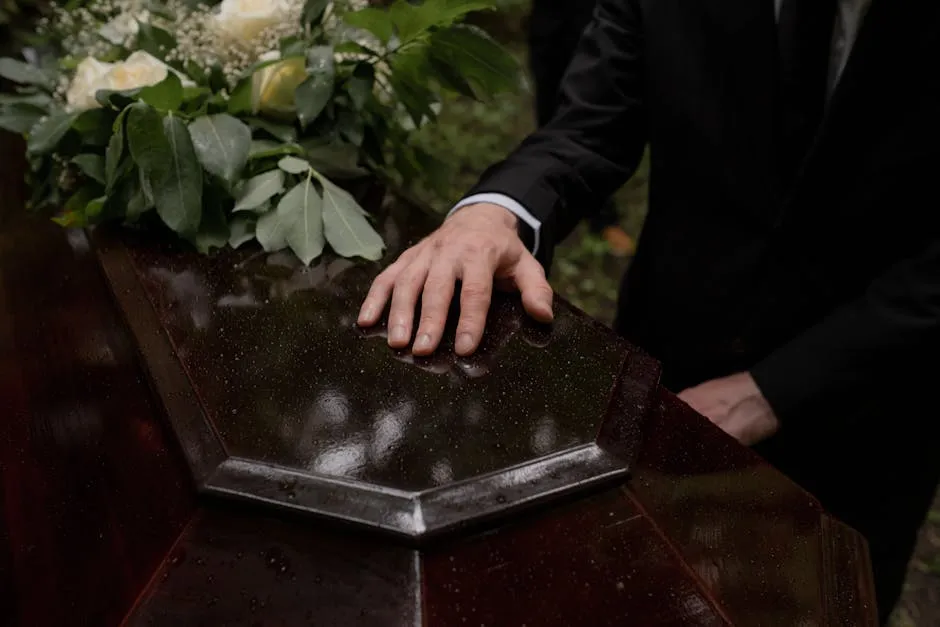
Why Can’t I Feel Happy Without My Ex?
Introduction
Breakups can be tough. Many people struggle to find happiness after losing a partner. It’s common to feel like happiness is tied to your ex. This can lead to a painful emotional cycle. Let’s explore why these feelings arise and how you can cope.
Summary and Overview
After a breakup, emotions run high. You might feel sadness, loss, or even longing for your ex. These feelings often stem from the deep emotional bonds formed during the relationship. Understanding why you feel unhappy without your ex is crucial for healing. Self-reflection allows you to process your emotions and identify patterns. It’s completely normal to struggle with these feelings. Remember, you’re not alone. Many share this experience. Thankfully, there are constructive ways to navigate these feelings and rediscover happiness.
If you’re looking for some inspiration to help you through this tough time, consider reading Emotional Intelligence 2.0 by Travis Bradberry. This book offers insights into understanding and managing your emotions, which can be incredibly helpful during your healing process.

The Emotional Rollercoaster of Breakups
The Initial Shock of a Breakup
The emotional impact of a breakup can be overwhelming. Initially, you may experience denial and sadness. Feelings of abandonment often creep in, leaving you feeling lost. Did you know that a significant percentage of people report intense emotional responses after a breakup? Statistics show that around 70% of individuals experience symptoms similar to grief. This “breakup shock” can be debilitating. But it’s a natural part of the healing process. Take a moment to reflect on your feelings. What emotions are you experiencing? Acknowledging them is the first step to moving forward.
To help navigate through these feelings, consider reading The Power of Now: A Guide to Spiritual Enlightenment by Eckhart Tolle. This book can help you find peace in the present moment and ease the emotional turmoil you’re experiencing.
Why We Idealize Our Exes
It’s common to remember only the good times with an ex. This selective memory can create a false sense of nostalgia. You might find yourself reminiscing about the laughter and joy you shared. But what about the tough moments? Cognitive dissonance plays a role here. Our minds often clash with conflicting feelings. We want to remember love but also acknowledge pain.
Studies show that memory bias is real. Research indicates that people tend to recall positive experiences more vividly after a breakup. In fact, about 60% of individuals report focusing on happy memories while downplaying negative ones. This leads to idealization. You may think your ex was perfect, overlooking flaws that contributed to the breakup.
To combat this idealization, consider reading The Gifts of Imperfection by Brené Brown. This book encourages embracing authenticity and vulnerability, helping you to see your past relationship in a more balanced light.

The Role of Attachment and Dependency
Understanding Emotional Dependency
Emotional dependency can deeply affect your feelings after a breakup. It refers to the reliance on another person for emotional support and validation. This dependency often stems from attachment styles formed during childhood. For example, individuals with anxious attachment may fear being alone. They often struggle more after a breakup.
Codependency is another factor. This occurs when one partner’s self-worth is tied to the other’s happiness. If you find yourself constantly seeking approval from your ex, you might be experiencing this. It’s hard to let go when your happiness feels intertwined with theirs.
Research on attachment theory reveals that those with secure attachment styles cope better with breakups. They tend to have healthier relationships and recover more quickly. Understanding your attachment style can be enlightening. It can help you identify patterns in your relationships and emotional responses.
Consider taking an online quiz to assess your attachment style. This self-awareness can guide you towards healthier future relationships. You might also want to explore Attached: The New Science of Adult Attachment by Amir Levine. This insightful book delves into different attachment styles and their impact on relationships.

The Biology of Attachment
Have you ever wondered why letting go of an ex feels so hard? The answer lies in our brain chemistry. When we fall in love, our brains release chemicals like oxytocin and dopamine. These neurochemicals play a crucial role in creating emotional bonds. Oxytocin, often called the “love hormone,” strengthens feelings of attachment. Dopamine, on the other hand, enhances feelings of pleasure and reward associated with our partners.
This powerful combination makes it difficult to move on after a breakup. Research shows that about 80% of people experience a significant emotional response following a breakup. The surge of these chemicals can lead to feelings of loneliness and sadness, as our brains crave that connection.
Understanding the neurochemistry of love can help you make sense of your feelings. It’s important to recognize that these feelings are normal and rooted in biology. So, if you’re struggling, you’re not alone. Why not explore more about the science of love and attachment? It might provide valuable insights into your emotional journey.

Understanding the science of love can shed light on your emotional experiences. Why do some people have a fear of public speaking (glossophobia)
Coping Mechanisms and Moving Forward
Learning to Love Yourself Again
After a breakup, focusing on self-love is essential. Building your self-esteem can pave the way for personal growth. Many find that dedicating time to self-care practices can dramatically improve their mental health. Did you know that 70% of people who engage in regular self-care report feeling happier?
Taking care of yourself can be as simple as enjoying a relaxing bath, pursuing hobbies, or spending time with friends. These practices help nurture your sense of self-worth and remind you that you’re deserving of love—both from others and yourself. Consider keeping a Self-Care: A Day and Night Reflection Journal by T. M. H. to help guide your self-reflection process.

As you embark on this journey, consider creating a self-care checklist. This can include activities like reading, exercising, or practicing mindfulness. Each small step you take towards self-love can lead you closer to healing. Embrace the process!
Finding Joy in Solitude
Learning to find happiness in solitude can be transformative. Many people think being alone equals loneliness, but it can actually foster self-discovery and fulfillment. Engaging in solo activities allows you to explore your interests without external pressures. Whether it’s painting, hiking, or reading, hobbies can bring joy back into your life.
Research shows that solitude can enhance mental health. A study found that spending time alone can lead to improved mood and increased creativity. Happiness in solitude isn’t just a concept; it’s backed by data. When you embrace solo moments, you create opportunities for personal growth and reflection.
So, why not challenge yourself? Try one new activity alone this week. Whether it’s visiting a museum or trying a new recipe, you might surprise yourself with the joy you discover. You could even grab a Yoga Mat for Home Workouts and try some yoga to enhance your self-discovery journey!

Seeking Support from Friends and Family
During tough times, leaning on friends and family is vital. Social support plays a crucial role in emotional recovery after a breakup. Sharing your feelings with loved ones can help lighten the load. Vulnerability can deepen connections and foster understanding.
Statistics reveal that people with strong social support systems recover more quickly from emotional distress. Having someone to talk to can dramatically improve your mood. It’s essential to remember that you don’t have to go through this alone.
So, reach out to your friends. Organize a get-together or simply chat over coffee. You’ll likely find comfort in their company and support. And while you’re at it, why not suggest a fun activity like playing Board Games for Socializing with Friends? It’s a great way to bond and create new memories!

Accepting the Past and Moving On
The Importance of Closure
Closure is essential for healing after a breakup. It allows you to let go of the past and accept what happened. Finding closure means acknowledging your feelings and the relationship’s end. It’s about making peace with your experiences.
When you achieve closure, you create space for emotional healing. Research shows that individuals who find closure recover faster and report less emotional distress. Studies indicate that about 75% of people feel relief after participating in closure activities.
To create personal closure, consider simple rituals. Write a letter to your ex, even if you never send it. Reflect on what you learned from the relationship. You can also create a goodbye ceremony, like releasing a balloon or lighting a candle. These actions can help you find acceptance and move forward. If you’re looking for a way to pamper yourself during this time, consider a DIY Spa Kit for Home Pampering to treat yourself!

Embracing New Experiences
Opening yourself to new experiences is vital for personal growth. After a breakup, it’s easy to feel stuck in the past. However, new relationships and activities can reignite your joy. Exploring new interests helps you rediscover what makes you happy.
Research indicates that engaging in new experiences boosts mental health. Studies show that individuals who try new activities report higher levels of happiness and satisfaction. This is because fresh experiences stimulate your mind and create positive memories.
So, take a leap into the unknown! Join a class, try a new hobby, or go on a solo trip. Start dating again when you feel ready. Each new experience can help you grow stronger and more confident. If you’re into cooking, grab a Plant-Based Cookbook for Healthy Eating to spice things up!

Conclusion
Navigating the emotional aftermath of a breakup is challenging. It’s normal to feel unhappy without your ex, but healing is possible. Remember, acceptance and closure are key components in reclaiming your happiness. By taking proactive steps, you can foster emotional well-being and find joy again. Embrace new experiences and allow yourself the chance to grow. You deserve happiness and fulfillment in your life.
Please let us know what you think about our content by leaving a comment down below!
Thank you for reading till here 🙂
All images from Pexels




